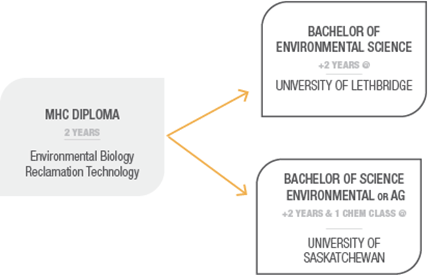Environmental Biology and Reclamation Technology
Environmental reclamation is the returning of lands disturbed from mining, oil and gas activities, transportation, or logging back into either economically productive or natural habitats. As an Environmental Biology and Reclamation Technology graduate, you will provide the expertise and support to carry out the reclamation and re-vegetation of these disturbed lands.
Our two-year diploma program was designed by employers to include specific training essential for this career while focusing on the unique environmental conditions of southern Alberta and Saskatchewan. You will develop your skills and knowledge in
- surveying and mapping,
- water and soil studies,
- botany and plant taxonomy,
- agronomy,
- weed control,
- environmental assessment and monitoring,
- environmental law,
- legislation and
- reclamation technologies.
Course related field trips and fieldwork may take place on weekends or may require overnight travel. Participation in all activities related to field trips and fieldwork is mandatory.
On-the-job duties may include coordination of field activities for monitoring and sample collection, data analysis, development of reclamation plans, carrying out environmental assessments, researching the history of well-sites, completion of documents and reports, supervision or implementation of weed management measures, or providing technical support for erosion and sediment control.
Development of practical skills and applied training will take place during the programs Capstone Project in the final term.
The environmental field is rapidly expanding and the demand for individuals with the required knowledge, skills and practical experience is increasing. Even during slowdowns in the oil and gas industry, the employment outlook for reclamation professionals remains strong.
DEGREE PATHWAYS
Start your education at MHC and transfer to University of Lethbridge or University of Saskatchewan to complete a degree!

Professional Certification
Graduates of the Environmental Reclamation Technician program are eligible to apply to the Canadian Environmental Certification Board (CECAB) for designation as EPIT (Environmental Practitioner in Training). Graduates are also eligible to apply to the Alberta Institute of Agrologists (AIA) under the designation of Registered Technician Agrologists (RTAg). Students should note provincial legislation in Alberta and Saskatchewan requires that to work as a professional and be able to sign off reclamation certificates individuals must be registered either as RTAg, PAg, PBIOL, RPF or FIT, or PEng.
Environmental Reclamation Technician Diploma after Degree option
Bachelor of Science students, or transfer students with advance standing through completion of a related diploma are accepted into the program in September of each year. Students will potentially be able to receive credit for up to 50% of the Environmental Reclamation program course requirements as a result of transfer credits from their degree. A minimum GPA of 2.0 is required for admission.
High school diploma with:
- ELA 30-1 (min. 50%) or ELA 30-2 (min. 60%)
- Math 30-1 (min. 55%), or Math 30-2 (min. 55%)
- Chemistry 30 (min. 55%) or Science 30 (min. 55%)
- Biology 20 (min. 55%)
- ELA 30-1 (min. 50%) or ELA 30-2 (min. 60%)
- Math 30-1 (min. 55%), or Math 30-2 (min. 55%)
- Chemistry 30 (min. 55%) or Science 30 (min. 55%)
- Biology 20 (min. 55%)
Computer competency requirement
Many of the courses in this program require a level of familiarity and competency with Microsoft Office suite of computer software. You are advised to enrol in MICO 191 before beginning this program if your computer skills are limited.
First Year
Fall Semester
- BOTA 205 - Introduction to Botany
- EREC 100 - Introduction to Environmental Science Concepts
- EREC 120 - Energy Fundamentals
- EREC 140 - Environmental Chemistry
- GEOG 201 - The Physical Environment
Winter Semester
- EREC 160 - Invasive Species Ecology and Management
- EREC 230 - Water Fundamentals
- EVSC 238 - Introduction to Geographic Information Science
- STAT 251 - Introduction to Applied Statistics
- ENGL 110 - Technical Communications
Second Year
Fall Semester
- BIOL 254 - Plant Taxonomy
- BIOL 255 - Ecology
- EREC 210 - Agrology and Agro-Ecology for Environmental Technologists
- EREC 250 - Applied Vertebrate Zoology
- SOSC 213 - Soil Resources
Winter Semester
- EREC 240 - Environmental Assessment
- EREC 260 - Land Reclamation and Revegetation
- EREC 263 - Land Reclamation Legislation
- EREC 285 - Capstone Project
- EVSC 336 - Advanced GIS and Remote Sensing







